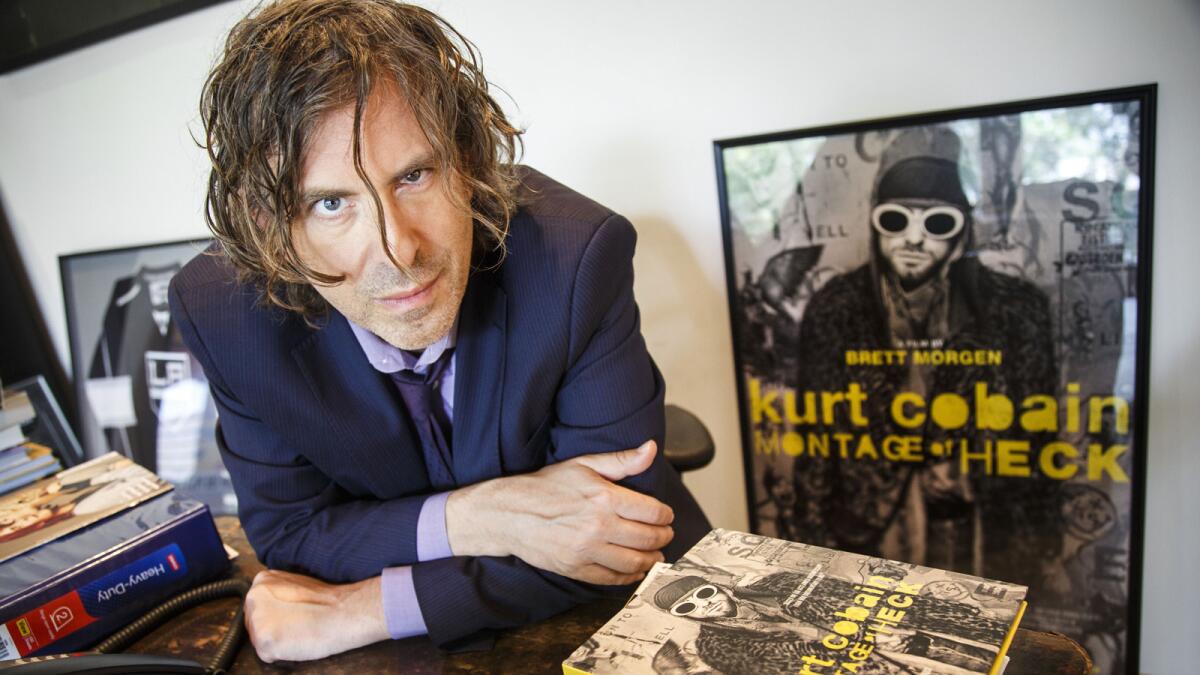How ‘Montage of Heck’ takes viewers inside Kurt Cobain’s troubled mind

Brett Morgen was in a taxi last month in London when he received news he had to share.
“Kurt Cobain: Montage of Heck,” Morgen’s powerful documentary about the late Nirvana frontman, had just opened in the U.K., and the director was scrolling through mentions of the film on Twitter while on his way to a post-screening Q&A. Given the preciousness with which many fans regard the subject of his movie — and because the film flouts so many established rock-doc conventions — Morgen had expected reaction to be polarized. But what he was seeing on Twitter was almost universally positive.
------------
FOR THE RECORD:
Kurt Cobain: An article about the documentary “Kurt Cobain: Montage of Heck” in the May 3 Calendar section said a sequence about Cobain’s first sexual encounter was animated by Stefan Nadelman. That sequence was created by the movie’s second animator, Hisko Hulsing. —
------------
“I was by myself in the cab, and I hadn’t talked to anyone since my last interview,” he recalled recently. “So I said to the driver, ‘I’m sorry, man, but I’ve got to tell you this,’ and I started reading him the tweets.” With a mordant chuckle, Morgen said that as much as he’d love to say he doesn’t care what people think of him and his work, he does care — deeply.
“I have what I now refer to as the Kurt disease,” he added.
It’s little wonder he contracted it. In the making since 2007 — when Cobain’s widow, actor-musician Courtney Love, promised Morgen access to a trove of the singer’s personal materials, including journals, drawings and more than 100 audiotapes — “Montage of Heck” reflects the director’s attempt to get as close as possible to the artist who committed suicide in 1994, just three years after Nirvana’s hit album “Nevermind” turned him into an alternative-rock icon.
The movie, set to premiere Monday night on HBO after a limited theatrical run, isn’t a coolly removed “Behind the Music”-style account of Nirvana’s ascent; it forgoes the omniscient narrator and contains relatively few talking-head interviews. Instead, Morgen plunges the viewer headlong into Cobain’s troubled mind, drawing on the singer’s vivid (and sometimes disturbing) aesthetic language to understand a man whose success never satisfied his need for approval.
Sheila Nevins, president of HBO Documentary Films, called the production “the most unusual biopicture I’ve been involved in” and said that Morgen “becomes the Siamese twin of the person he’s making a movie about. He gets attached to his subject in such a way that he devours it.”
Morgen, 46, was hardly looking to devour Cobain before Love approached him with the offer that set “Montage in Heck” in motion. “I didn’t come at this from a fan’s perspective,” said the director, best known for “The Kid Stays in the Picture,” his 2002 portrait of film producer Robert Evans. (He’s also made documentaries about the Rolling Stones and the 1968 Democratic Convention.) Nirvana, he added, was no more important to him than the band was to anyone paying attention to rock throughout the ‘90s.
But once he began sifting through Cobain’s things, untouched in a storage space since shortly after the singer’s death, “it became clear that we had the rare opportunity to do a movie in which Kurt articulated his experience in the best way that he could using the full breadth and depth of cinema,” Morgen said during a long, intense conversation at his sparsely decorated L.A. office. “That was what excited me.”
Among the discoveries were jarringly personal home videos of Cobain and Love that show the couple grappling with their newfound celebrity. In one clip, shot in a dingy bathroom while the two are wrapped in towels, they joke about their (mis)representation in the media — a unique glimpse of the obsession with image that later led them, as Nirvana’s former publicist Jim Merlis told me, to request that every review of the band’s album “In Utero” be faxed to their house.
Yet “Montage of Heck” also features bits of private audio recordings Cobain made years before he was famous in which we hear him working on songs and recounting anecdotes from his youth in small-town Washington state. Perhaps the film’s most disturbing sequence is a lengthy story Cobain tells about his first sexual encounter that ended with his being so humiliated that he considered killing himself. Set in the movie to eerie animation by Stefan Nadelman, the tale feels both honest and rehearsed, with precise wording and delivery that suggests Cobain was performing even if only for himself.
That balance seldom came through in the singer’s conventional media appearances, Morgen said, in which Cobain could seem “too earnest or too withdrawn or too measured or too sarcastic.” On his own, though, in his diaries and sound collages, he used the expressive tools at his disposal to achieve a kind of heightened truth — art, in other words.
It was that quality that Morgen sought to channel in “Montage of Heck,” with its liberal use of special effects and its dramatically staged interviews with members of Cobain’s family, a girlfriend, Love and Nirvana bassist Krist Novoselic. Asked if the stark lighting in some of the interviews — in particular with Cobain’s imposingly stoic father, Don — represents a manipulation of the viewer, Morgen scoffed.
“I was directing,” he said, before he launched into a mini-monologue about the crucial embrace of filmic technique by documentary pioneers like Errol Morris and Frederick Wiseman.
Perched at the edge of his chair, his long hair hanging in front of his eyes, Morgen grew agitated as our talk turned to the few criticisms he’s heard amid the overwhelming praise for “Montage of Heck.” One concerns the lack of input from Nirvana drummer Dave Grohl, who Morgen said was interviewed too late to include in the film. More important, though, the director questioned the perceived need for Grohl’s comments in a film about Cobain’s interior journey.
“What’s missing from the movie?” he asked. “I’m very devoted to the through-line of action. Every frame in this movie goes back to that core line, and when you deviate from that, the movie comes to a stop.”
Something else that nags him is the idea that he was steered in his filmmaking by Love or by her and Cobain’s 22-year-old daughter, Frances Bean, who appears in “Montage of Heck” as an infant — including in a scene that depicts Cobain holding his daughter while apparently high on drugs — and who took control of portions of her father’s estate in 2010. It was Frances’ cooperation that persuaded Kurt Cobain’s parents and sister to take part in the film, Morgen acknowledged. But he insisted that neither she nor Love had any effect on the final cut.
Which doesn’t mean he’s not concerned with their feelings. Because Frances has granted only a single interview about “Montage of Heck” (to Rolling Stone, which illustrated its story with a ghoulish suicide-chic portrait of her), Morgen has been asked countless times about her, he said — about what she thinks of the movie, about her opinion of her dad’s music, about her notoriously bumpy relationship with her mom.
“I saw her in L.A. the other night and said, ‘Listen, I get asked these questions about you and I try to be very careful about what I’m saying, but it feels exploitative and I’m not comfortable with it,’” he recalled. “And she was like, ‘Dude, don’t worry about it.’”
Yet the Kurt disease makes that impossible.
“I feel like there are some things that should be private, but if I say that in an interview, people think I’m withholding,” the director continued, sounding not unlike his famously sensitive subject. “I mean, just because you make a film doesn’t mean someone has the right to go anywhere.”
Twitter: @mikaelwood
More to Read
The biggest entertainment stories
Get our big stories about Hollywood, film, television, music, arts, culture and more right in your inbox as soon as they publish.
You may occasionally receive promotional content from the Los Angeles Times.











